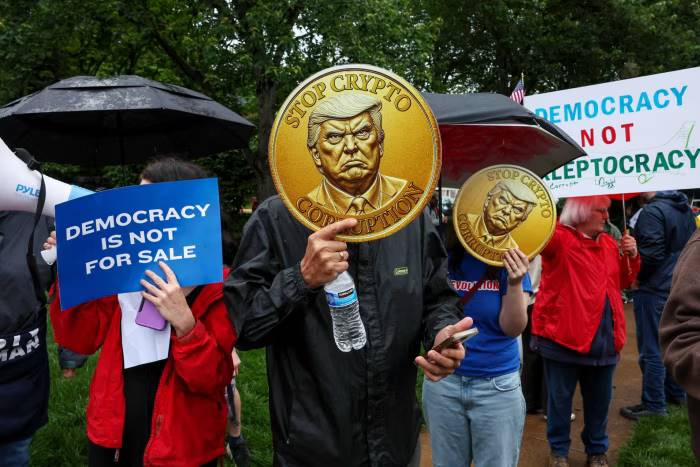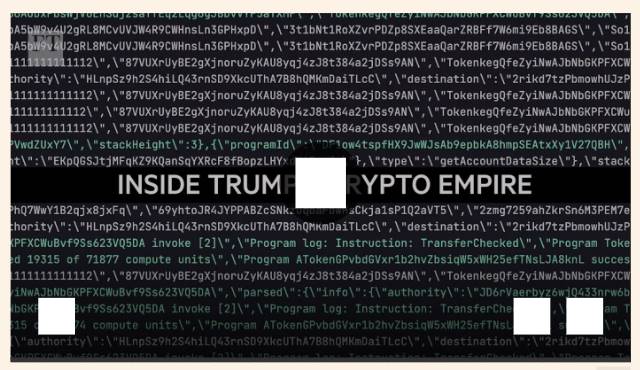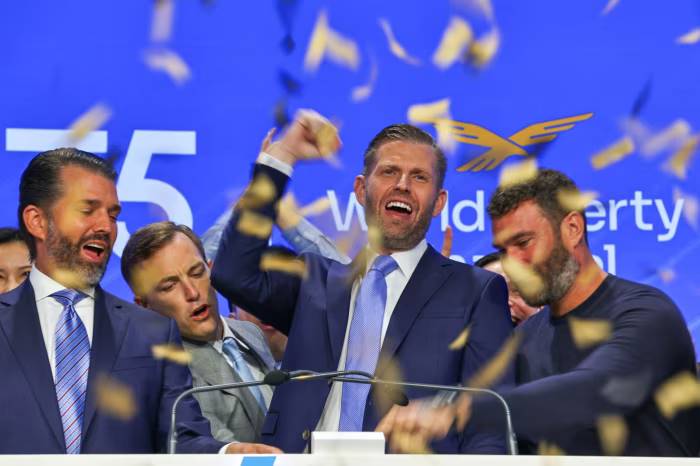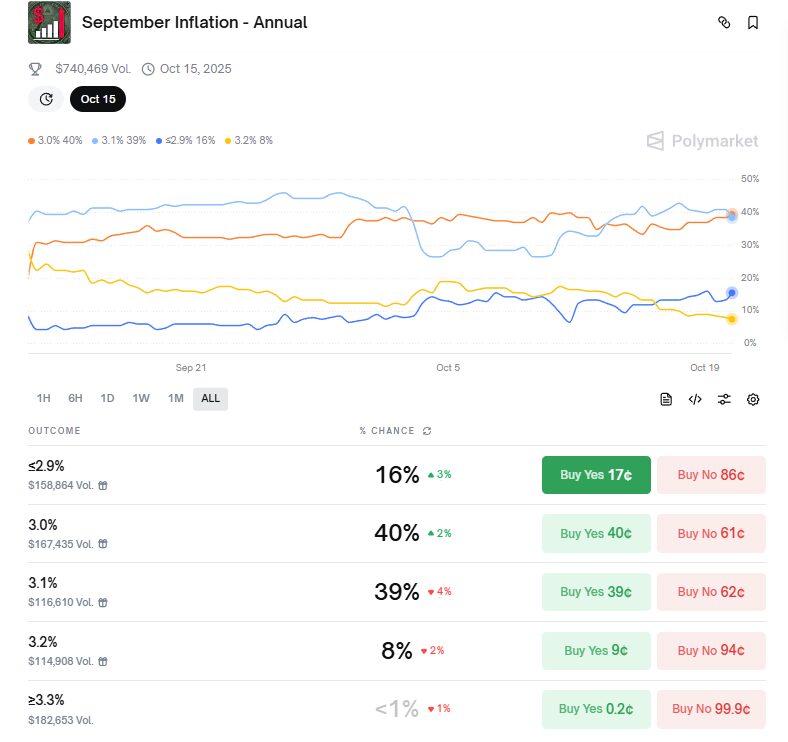Outside the White House, is Trump's real 1 billion dollar source in crypto?
Author: Financial Times
Translation: TechFlow
Original Title: How Did Trump's Company Earn 1 Billion Dollars from the Crypto Market?
At the peak of last year's legal disputes, Donald Trump claimed he was out of money. In court documents, the president stated that if a $500 million civil fine could not be reduced to about $100 million, he would have to sell off his remaining real estate assets at a low price.
Just a few months later, the incumbent U.S. president experienced a dramatic reversal both politically and financially. While previous White House occupants made modest financial sacrifices for the presidency, Trump’s wealth has grown significantly since taking office. His family business has struck deals both domestically and abroad, showing little concern for conflicts of interest.
After earning millions from selling branded Bibles, perfumes, sneakers, and signature guitars, the president also received tens of millions in compensation from social media and news companies. These companies settled lawsuits with Trump, which many legal experts considered to be almost baseless. His wife Melania signed a $40 million documentary deal with Amazon, far exceeding industry standards.
However, at the core of Trump’s new wealth is a rapidly growing crypto empire built by the president and his family. According to an investigation by the Financial Times, this business has earned over $1 billion in pre-tax profits in the past year, partly fueled by the crypto boom driven by his administration’s pro-industry policies.
The revenue calculations for these crypto projects only include realized profits. Trump’s crypto business has also increased his paper net worth by billions. For example, his stake in Trump Media & Technology Group—the parent company of Truth Social and a bitcoin reserve business—is now valued at $1.9 billion.
When asked whether the Financial Times’ estimate of his family’s profits was roughly accurate, Eric Trump said the actual number “could be more.”
This crypto empire is built on a vast, opaque network covering digital trading cards, memes, stablecoins, tokens, and so-called decentralized finance platforms in this largely unregulated industry—all claiming close ties to the presidential family.
These projects have attracted huge sums from billionaire foreign investors, institutions linked to state entities, and at least one individual previously investigated by U.S. authorities.
All of this has happened as Trump fulfilled his promise to become the “first crypto president.” He has called for the creation of a national bitcoin reserve and appointed crypto-friendly leaders to major U.S. regulatory agencies. Under the new leadership, the U.S. Securities and Exchange Commission (SEC) has halted investigations into major crypto companies.
In the past nine months, bitcoin prices have repeatedly hit new highs; companies that fled the U.S. during Joe Biden’s administration have made a strong return; and crypto executives have been warmly welcomed in Trump’s White House.
“We’re going to go further, and faster than people think,” Trump said of the crypto industry this summer. “It’s a very hot industry.”
The White House stated that during his first term, Trump was the only sitting president to lose money while in office.
“The fact is, President Trump built a business empire before entering politics—he was the wealthiest presidential candidate in history at the time,” White House spokesperson Kush Desai said. “His only motivation is to save our country and people, giving up a luxurious life to run for president.”
However, many observers believe the president’s embrace of high crypto profits—part of a broad merging of business and political interests—is unprecedented in modern U.S. history.
“Since the Civil War, every president has avoided major financial conflicts with their official duties,” said Richard Painter, former White House ethics lawyer under President George W. Bush. He believes Trump should divest all financial interests that could conflict with his official duties.
Painter noted that Jimmy Carter placed his peanut farm in a blind trust, while George W. Bush sold his stake in the Texas Rangers before becoming president. “Even Nixon didn’t have financial interests that we know of that conflicted with his official duties.”
Trump was not an early crypto advocate. In the years before the 2024 presidential campaign, he called crypto “something out of thin air” and labeled bitcoin a “scam.” He also depicted crypto as contrary to U.S. interests because it could compete with the dollar.
However, starting with last year’s campaign, Trump’s attitude shifted abruptly. At the time, Trump fiercely criticized Wall Street banks, claiming his businesses were de-banked for political reasons. The Trump family said this was one reason they turned to the crypto industry.
“We were targeted and had to look for alternatives to traditional finance,” Eric Trump told the Financial Times in June this year.
During last year’s campaign, Trump promised to end Biden’s “anti-crypto crusade,” fire crypto-skeptical SEC Chairman Gary Gensler on “day one” in office, and establish a U.S. bitcoin reserve.
“Rules will be made by people who love your industry, not by people who hate your industry,” he said at a crypto conference in Nashville in July 2024.
This strategy stands in sharp contrast to the Biden administration, which has taken a more cautious approach to crypto, worrying about price volatility and potential scams. During Biden’s tenure, some of the industry’s largest companies were sued or charged by U.S. law enforcement, and FTX founder Sam Bankman-Fried was jailed for fraud and money laundering.
 Trump pushed crypto into the mainstream almost immediately after returning to the White House.
Trump pushed crypto into the mainstream almost immediately after returning to the White House.
On Trump’s inauguration day, Gary Gensler resigned. The president appointed crypto supporter Paul Atkins as his replacement. Since then, the SEC has terminated or settled with several presidential inauguration donors, including Coinbase, Ripple Labs, and Consensys.
Trump ordered the Justice Department to reduce investigations into crypto companies. In April this year, the Justice Department announced that, under a presidential executive order, it would “not charge unintentional regulatory violations in cases involving digital assets.”
He also signed an order allowing Americans to invest part of their retirement savings in crypto, a huge boon for the industry. Meanwhile, new legislation established a regulatory framework for stablecoins. Regulations restricting mainstream banks from participating in crypto were also repealed.
Additionally, the president pardoned Silk Road founder Ross Ulbricht and employees of the BitMEX crypto exchange, moves widely welcomed within the industry.
Investors cheered the new policies, sending bitcoin and other lesser-known token prices to all-time highs.
Meanwhile, Trump’s family business bought bitcoin and other tokens and made multiple investments to capitalize on rising prices.
Just days before Trump took office, he launched memecoins related to himself and his wife Melania. Financial Times analysis shows these tokens have no use beyond speculation but generated about $427 million in sales and transaction fee revenue.
The specific distribution of profits from these memecoin projects is unclear. The official “Get Trump Memes” website states that Trump-related companies “jointly own” 80% of the $TRUMP token project. The only company mentioned on the $MELANIA website is the Trump family business MKT World.
Trump leveraged the aura of the presidency to promote his crypto projects. Earlier this year, the price of $TRUMP fell, but then Trump announced he would host a private dinner at his golf club in May for the top 220 holders of the memecoin, which boosted the price.
Trump personally also earned hundreds of millions from World Liberty Financial, a company founded by his son and Steve Witkoff’s son. The company operates two tokens—a tradable “governance” token called WLFI, whose holders can vote on some World Liberty Financial policies; and a stablecoin called USD1, pegged to the dollar.
According to Financial Times calculations, the business has so far earned $550 million from selling WLFI tokens and $2.71 billion from selling the USD1 stablecoin. World Liberty Financial spokesperson David Wachsman declined to comment.
To maintain the value of USD1, the company must hold assets as reserves backing the token, so the sales revenue from these tokens does not immediately translate into profit. But if the proceeds are invested in short-term U.S. debt, World Liberty Financial could have earned about $40 million in interest and fees so far from the assets backing the USD1 stablecoin.
Trump family company DT Marks DEFI LLC initially held a 75% stake in World Liberty Financial but later reduced its stake to 38%. It is unclear to whom the Trump family sold part of its stake or at what price.
According to Trump’s latest financial disclosure, he received $57.3 million in personal income from World Liberty Financial in the 2024 calendar year.
Trump also earned millions by selling digital cards depicting him in superhero costumes or riding motorcycles.
Even Trump companies that previously had almost no connection to the crypto industry have profited from embracing it. Trump Media & Technology Group (TMTG) lost $401 million in 2024, but after pivoting to crypto this year, the company raised billions to buy tokens and launched several bitcoin funds. This shift generated over $3 billion in cash income, more than half of which went to Trump, as he owns nearly 53% of the company.
Most of Trump’s crypto projects are managed by a revocable trust overseen by Donald Trump Jr. The White House claims this protects the president from any wrongdoing.
However, unlike most recent former presidents, Trump has not placed his interests in a “blind trust” managed by an independent party. Instead, he is the sole beneficiary of the trust and can access the funds at any time after leaving office.
Many of the Trump family’s most high-profile crypto actions have taken place in public view, but aside from some Democratic lawmakers and ethics activists, they have not sparked widespread outrage.
According to a poll commissioned by the Financial Times and conducted by Public First US among Trump voters, more than half of respondents believe the president earned less than $100 million while in office, and nearly a third think he made no profit from the presidency at all. In addition, more than 40% said they had never heard of Trump’s memecoin or his family’s crypto platform.
 Among Trump’s many intersections with the crypto world, one example has not sparked widespread national attention. Justin Sun, a Chinese-born crypto billionaire who was investigated by the SEC for fraud and market manipulation, invested $75 million in World Liberty Financial shortly after last year’s election. But this event did not attract much national media coverage.
Among Trump’s many intersections with the crypto world, one example has not sparked widespread national attention. Justin Sun, a Chinese-born crypto billionaire who was investigated by the SEC for fraud and market manipulation, invested $75 million in World Liberty Financial shortly after last year’s election. But this event did not attract much national media coverage.
Three months later, the now Trump-controlled SEC suspended the fraud case against Justin Sun to “explore potential solutions.” Sun responded to the news with a series of handshake emojis.
Subsequently, in May, he dined with President Trump at a golf club in Virginia and became one of the most prominent promoters of the $TRUMP memecoin, promising to buy another $100 million worth of tokens.
Justin Sun stated that his interest in Trump-related projects reflects his optimism about the U.S. government’s laissez-faire approach to crypto regulation and the president and his cabinet’s embrace of the technology. Meanwhile, the Trump White House claims it is supporting an emerging technology unfairly maligned by Democrats, seeking to make the U.S. the “global crypto capital.”
Nevertheless, Trump family members continue to actively promote the connection between their projects and the president.
Eric Trump told the Financial Times in June this year that $TRUMP is “the most successful memecoin to date,” partly because the industry “has shown tremendous support for my father.”

Foreign governments and other investors linked to state entities have also joined Trump’s crypto projects. Earlier this year, Abu Dhabi-owned investment firm MGX bought $2 billion worth of Trump-backed stablecoins. Chinese company GD Culture Group announced it had raised $300 million to invest in bitcoin and Trump’s memecoin $TRUMP.
In June this year, a UAE fund calling itself Aqua 1 Foundation purchased $100 million worth of digital tokens issued by World Liberty Financial, becoming its largest known investor.
Meanwhile, Trump continues to gain political benefits through crypto donations. In just the first half of 2025, Trump’s Super PAC received at least $41 million in donations from the crypto industry, helping him build a war chest to support candidates loyal to his agenda in the upcoming midterm elections.
World Liberty Financial itself is supporting a new organization called the Digital Freedom Fund PAC, which aims to “advance President Trump’s crypto vision.” Crypto billionaires the Winklevoss twins said they donated $21 million worth of bitcoin to the organization, while crypto exchange Kraken said it donated $1 million.
Many cabinet members have also benefited from the crypto resurgence. Commerce Secretary Howard Lutnick’s brokerage Cantor Fitzgerald (now run by his son Brandon) holds large bitcoin positions. More importantly, the company is the main custodian of the billions of dollars in U.S. Treasuries held by Tether, the world’s largest stablecoin company.
The U.S. Department of Commerce stated: “The Secretary has fully complied with the divestment and recusal provisions of the ethics agreement.”
According to government financial disclosure documents, Vice President JD Vance, who has attended bitcoin conferences, also personally holds crypto, as does Federal Housing Administration chief Bill Pulte.
 Trump’s longtime friend and U.S. Middle East envoy Steve Witkoff, along with his sons Zach and Alex, co-founded World Liberty Financial and currently hold 3.75 billion WLFI tokens worth about $530 million. The Witkoff family and another company will receive 25% of the platform’s revenue.
Trump’s longtime friend and U.S. Middle East envoy Steve Witkoff, along with his sons Zach and Alex, co-founded World Liberty Financial and currently hold 3.75 billion WLFI tokens worth about $530 million. The Witkoff family and another company will receive 25% of the platform’s revenue.
White House legal counsel David Warrington said Witkoff is working with ethics officials “to ensure he is in full compliance with these rules, including taking all necessary legal steps to divest.”
Although Eric Trump promised last year that there would be a “very big wall of separation” between his family business and the U.S. government, Trump’s sons have most publicly leveraged their father’s position. They have flown to cities such as Abu Dhabi, Hong Kong, and Singapore to attend conferences, promote the advantages of crypto, and attract investment for their projects.
Donald Trump Jr. highlighted the Trump administration’s personal interest in the crypto industry. At the Bitcoin conference in Las Vegas in May, he said that those making crypto laws now “are also investing in crypto themselves,” adding, “This will be very beneficial for the entire community.”
That same month, Eric Trump assured crypto speculators that Washington would hoard “a large amount of bitcoin,” and later predicted that bitcoin, currently worth about $110,000, would one day be worth $1 billion.
“The level of acceptance for my father by the bitcoin community is something I’ve never seen before,” Eric Trump said recently in Hong Kong. “I hope this acceptance brings great returns.”
Additional reporting by George Steer and Jill R Shah in New York.
Disclaimer: The content of this article solely reflects the author's opinion and does not represent the platform in any capacity. This article is not intended to serve as a reference for making investment decisions.
You may also like
Crypto Prepares for Volatility Storm as CPI Data and Fed Meeting Loom

Societe Generale: A mild recession in the US could weaken the dollar
Chainlink Eyes $100 After S&P Global Collaboration Boosts Investor Optimism

